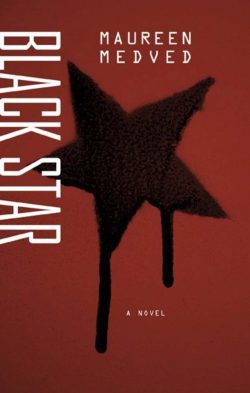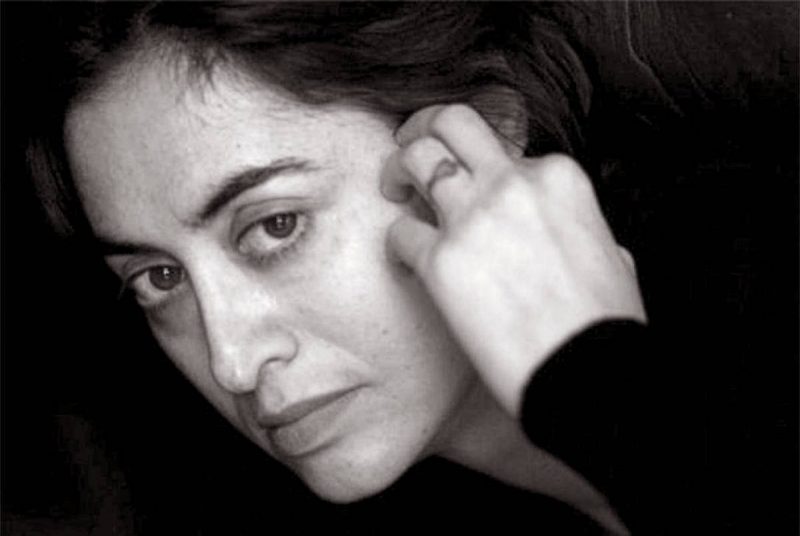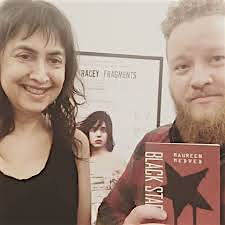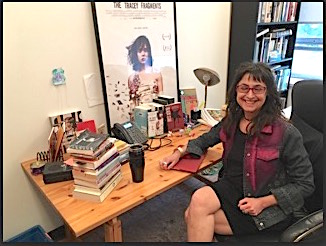#526 Lies, tenure, and dark energy
Black Star
by Maureen Medved
Vancouver: Anvil Press, 2018
$20.00 / 9781772141122
Reviewed by Theo Dombrowski
First published Apr. 7, 2019
*
 Encountering the barbed and dazzling shards that make up the word world of Black Star, a reader might feel on uneven ground. And for good reason. This is a novel that jolts, jars, teases, tickles, tweaks, yes, but also does something much darker: it thickens into something viscous, difficult, and adhesive, something hard to engage with — or to escape from.
Encountering the barbed and dazzling shards that make up the word world of Black Star, a reader might feel on uneven ground. And for good reason. This is a novel that jolts, jars, teases, tickles, tweaks, yes, but also does something much darker: it thickens into something viscous, difficult, and adhesive, something hard to engage with — or to escape from.
What is Medved up to? Well, she seems to be up to lots of different things at the same time. And what she is up to has both a unified over-all impact (and impact is the right word), and no single clear purpose — other, perhaps, than do what many an “original” novel does — create. Reflect, to some extent, yes, but above all create.
This is not a comfortable novel. It requires sharp eyes and multi-faceted awareness. Amongst its many provocative (and sometimes provoking) tactics, arguably the most defining are five: the sharp handling of language and narrative flow, the barbed and angular comedy, the punch drunk depiction of “academia” (the word is much repeated), the tight and twisted plot line, and, perhaps most important to the novel’s impact, the overwhelming presence of philosophy professor Del Hanks, the narrator and chief character.
Most readers, understandably, see the novel as a darkly funny satire on academia (and particularly moral philosophers). From this perspective, the dominant line of action is the protagonist’s attempt to get tenure and to make her way through the grotesque politics standing in her way. Parallel and interrelated is her attempt to finish her book on the morality of making decisions, The Catastrophic Decision. Through all this, Medved doesn’t allow the reader the least reprieve: barely a page goes by without more and yet more anxious thoughts about tenure and/or the manuscript.
Slewing between panic and paralysis, with only glimmers of hope, Del finds outlet in often sarcastic attacks on “Academia:” “Academia didn’t make sense to me anymore. Strange codes. Rules.” Academia, in Del’s eyes, consumes its young. As she reflects, bleakly: “The system devours some, inalterably changes others.”
It gets worse: “Academia steals our lives, our young gleaming lives,” she broods at one point, and, at another, inveighs against everyone in it, chockablock with “ass kissers, back stabbers and liars.” Through such attacks it is entirely possible Medved is, like many satiric novelists, hiring an assassin to carry out the slaughter, setting Del up as satiric mouthpiece. It is, however, equally arguable that she is encouraging us to see such snarls less as insight into academia than as a way into understanding her protagonist’s frustrations and fear of failure.
Academia is peopled with academics. In a live reading from the novel, Medved chooses passages from the novel about the most colourful member of this particular corner of academia, Helene LeBec, a newly arrived “adjunct,” and the absolute centre of Del’s fear and fascination (and, as it turns out, just about everyone else’s). The author’s live reading is broad, clearly aimed at getting laughs from her audience. Even without the benefit of such a live reading, those readers who emphasize the comic nature of the novel have a lot to draw on in the almost cartoon-like characterization of LeBec. Her name alone says a lot: quite apart from the obvious French meaning of “beak,” a medical dictionary tells us a “bec” is a pain in the rectum/ass. Indeed, considering in part this bizarre character, readers who have objected to the novel’s unrealistic portrayal of academia are, in many ways (but perhaps not all ways) justified.
Helene LeBec, the sex-kitten wunderkind animal rights activist, is a comic grotesque, but no more grotesquely comic than the path she ploughs through the philosophy department, or the novel itself. As Del mutters bitterly, “Her pedantic diatribes on the rights of the mouse and the chicken were compared to those of the world’s greatest philosophers.” Her silly-slick tweets on animal rights, her preposterously skimpy outfits, and, most outrageously, her (almost) unimpeded black magic grip on the whole, credulous, bedazzled philosophy department — not to mention almost the entire academic establishment of the western world — are the stuff of fairy tales, grim fairy tales.

We expect a star to be bright, to sparkle. But this book is called Black Star for a reason. Helene LeBec is a star, certainly, in the sense (we are much reminded) of a “stellar” performer (our narrator does a lot with the notion of “stellar” academics, and the other, unstellar, sorts.) Helen LeBec takes her stellar attributes to extremes on almost all levels. As a kind of conflation of black hole and star, however, this Black Star ultimately emits only the blackest of energy. Nothing much escapes her event horizon.
Other, more difficult, comedy crackles through what purports to be our protagonist’s manuscript on the moral philosophy involved in making difficult choices. As with her portrayal of Helene LeBec, Medved is audacious. Not the least bit coy about merely hinting at Del’s manuscript, she slaps down big chunks of “philosophy” in front of the readers, thus tasked with navigating their way through some truisms of different moral perspectives (deontology and utilitarianism) and, coupled with them, preposterous hypothetical situations involving a hog, plastic platforms, sinking boats, a bully named Hitler and the like.
Readers familiar with the dog-eared “trolly problems” popular in ethics may well be both bemused and amused. In lieu of any close argument, the manuscript is made up almost entirely of questions, some vaguely relevant, others verging on nonsense. Yet such stuff probably is most satisfying to read not as a mirror (distorted or otherwise) of moral philosophy, but, rather, as the vehicle into the flailing mind of a deeply troubled central character, stumbling between commonplaces and confusions, terrified (with good reason) of being seen as an “inept goofball.”
Nevertheless, whatever comedy there is in the book, most readers will probably feel it is swamped by something altogether darker. Indeed, it’s difficult to find a single character or incident that is pleasant or positive. Expect lots of blood, mud, and vomit. Just about the only colour (outside LeBec’s clothes) used is “black” and that chimes repeatedly and insistently, particularly in the last part of the novel. Even when it is sunny, Del feels, “the sun tore a hole through the dark sky.” Such is the degree of dark and twisted imagery, that much of the novel can most satisfyingly be read as the outline for a gothic graphic novel for adults. There is even something of a Tim Burton aesthetic at work in everything from the “black triangles” of hair that cover a major character’s face, the “black star” (another reference) that glints in the centre of his eyes, to Del’s abandonment of her normal black garb, and her donning in the final, crazed scenes, a quasi-wedding dress —increasingly torn, drenched, and filthy.
The same gothic quality is at play in the deeply troubled and deeply unreliable narrator, Del. Readers who know Turn of the Screw (and/or the whole narrative tradition around it) will feel familiar with the psychologically disturbing territory made famous in Henry James’ classic novella. In such tales we are trapped claustrophobically inside the mind of a character with a tenuous hold on reality, simultaneously frantic to escape herself and, with every raw encounter with others, damaging herself further and yet further, until she is, in Del’s terms, “distant, lonely and saturated with self-loathing.” In Medved’s version of this hell, broken syntax and mere fragments of thoughts reinforce the exhausting vision of a woman painting herself into a corner with jagged brush strokes.

In some ways it is hard to imagine a more disengaging narrator: Medved crafts a thoroughly unpleasant character, hell bent (almost literally) on wounding herself while frantic to survive. Deeply and viciously suspicious about all her colleagues (possibly, just possibly, with some justification), abrupt, demeaning, abrasive, sarcastic, and aloof, she is the dream child of the misanthrope. Even her appearance, as she reminds us repeatedly, is charmless. Squat, unprepossessing, she seems to lead into every scene with what she calls, repellently, a “prolapsed neck” — a condition that, if Google is any guide, doesn’t quite exist.
And yet. Medved loosens any grip we might feel we have on understanding this unsympathetic woman. First, as the author shows, her tough shell cracks with flashes of pity and affection for others. Tanis, whose progressive cancer darkens an already dark plot, moves Del to muse, “Tanis had become magnificent, glorious, beyond anything I’d known.” Likewise, for the homeless youth, Cody (more of whom soon), she feels “shock, pity and then sorrow.” Later, she wails, “He was a beautiful creature and didn’t deserve to be shunned.”
Second, Del does double duty not only as the protagonist of a gothic psychosexual nightmare, but, anomalously, also as the protagonist of a “naturalist” socio-economic case history. As such, she is a kind of sad and sorry victim of social injustice, not unlike a character out of such early “naturalist” writers as Zola, Faulkner, or (in CanLit) Callaghan. From this perspective, she is a working class woman struggling futilely against the crippling effects of an impoverished and debilitating childhood.
In contrast to Le Bec and her privileged academic childhood, Del suffered, as she says, a “Derelict upbringing.” She recalls, “My dearth of intellectual stimulation. The girth of People magazines, candies, and colas hoarded in my underwear drawer.” Yet, admirably, she tells herself, “Don’t bathe in self-pity.” Almost affectingly, in this thread of narrative, the crony-voice of Del’s mother surfaces repeatedly, counselling mediocrity and predicting failure. “Just look at you. No one’s going to marry you. No one’s going to give you a child.” Little does she know. The name of Del’s childhood neighbourhood, Slaughter, says it all.
Third, and most important, Del has secrets. The first, she tells us almost directly: “My academic position was based on a fabric of lies and deception.” How much this is true, and how it is related to a deeper secret, Medved initially withholds. The second, related to the first, is a secret whose revelation acts, in many ways, as the climax of the novel. It is a secret hinted at throughout in many different ways, not least of all in the recurring words of her grad school mentor, McGillvery, “Christ, Del, nobody died.” It is a secret, not least, whose knife-edges slice through just about every moment of her subsequent life, like, as she imagines, the “five pointed star” of McGillvery’s treatise on the lack of moral absolutes. Revealingly, her own research and unfinished manuscript, The Cataclysmic Decision, is the fumbling search for just an absolute. Think: Sophie’s Choice. Battered by imperatives of deontology and utilitarianism, she, like the Sophie in Styron’s award winning novel, chose — and, ever since, has had to live with the consequences.
How Medved brings her readers to this conclusion is probably the most crafted aspect of a carefully-wrought series of suggestions, many of them small-f “Freudian,” glinting through the dark places of the novel. In fact, for what it’s worth, a second reading of the novel makes for a comparatively rewarding experience, as apparently unrelated tics interconnect from the perspective of the novel’s final pages. Hints of mental illness, addiction, and a harrowing experience come together to fill out our understanding. Towards the end, Del has a ghoulish storm-vision of a towering presence in the forest she calls Anciana Madre. This, like her yelling at one point, “I am not your mother!” show just how much Medved likes to work through the most pointillistic of hints.

The most “novelistic” part of this process arises from Del’s interaction with a figure under a stairwell, a homeless youth whom Del passes each day with disturbed fascination on the way to her classroom. Almost relentlessly, Medved documents Del’s obsessive thoughts about this seemingly phantasmal cypher, until, as we are led to expect, the two encounter each other: “His eyes locked on mine as a blade of fear cut through me”. Finally resolving into a real person, Cody, (with an oedipally-injured foot), brings out troubling, but human, responses in Del.
Through graphing their encounters, culminating, after a hiatus, in a kind “dark-and-stormy night” confrontation, Medved not only deftly interconnects the reversals and revelations from Del’s past with the events of her chaotic present, but, additionally, cranks up the gothic nature of the devastating final pages. That her ultimate purpose is not to leave her readers with a frisson of shock but something more peaceful, more hopeful, emerges only in the final, harrowingly gentle, sentence.
*

Born on Vancouver Island, Theo Dombrowski grew up in Port Alberni and studied at the University of Victoria and later in Nova Scotia and London, England. With a doctorate in English literature, he returned to teach at Royal Roads, the University of Victoria, and finally at Lester Pearson College at Metchosin. He also studied painting and drawing at the Banff School of Fine Arts and at UVic. Theo Dombrowski is the author and illustrator of popular guide, travel, and hiking books including Secret Beaches of the Salish Sea (Heritage House, 2012), Seaside Walks of Vancouver Island (Rocky Mountain Books, 2016), and Family Walks and Hikes of Vancouver Island — Volume 1: Victoria to Nanaimo, and Volume 2: Nanaimo North to Strathcona Park (Rocky Mountain Books, 2018), reviewed by Chris Fink-Jensen in The Ormsby Review no. 384, September 25, 2018, and a Kindle book, When Baby Boomers Retire: Getting the Full Scoop. You can learn more about him from his website. Theo lives at Nanoose Bay.
*
The Ormsby Review. More Books. More Reviews. More Often.
Editor/Designer/Writer: Richard Mackie
Publisher/Writer: Alan Twigg
The Ormsby Review is a journal service for serious coverage of B.C. books and authors, hosted by Simon Fraser University. The Advisory Board consists of Jean Barman, Robin Fisher, Cole Harris, Wade Davis, Hugh Johnston, Patricia Roy, David Stouck, and Graeme Wynn. Scholarly Patron: SFU Graduate Liberal Studies. Honorary Patron: Yosef Wosk. As of September, 2018, Provincial Government Patron: Creative BC
“Only connect.” – E.M. Forster

